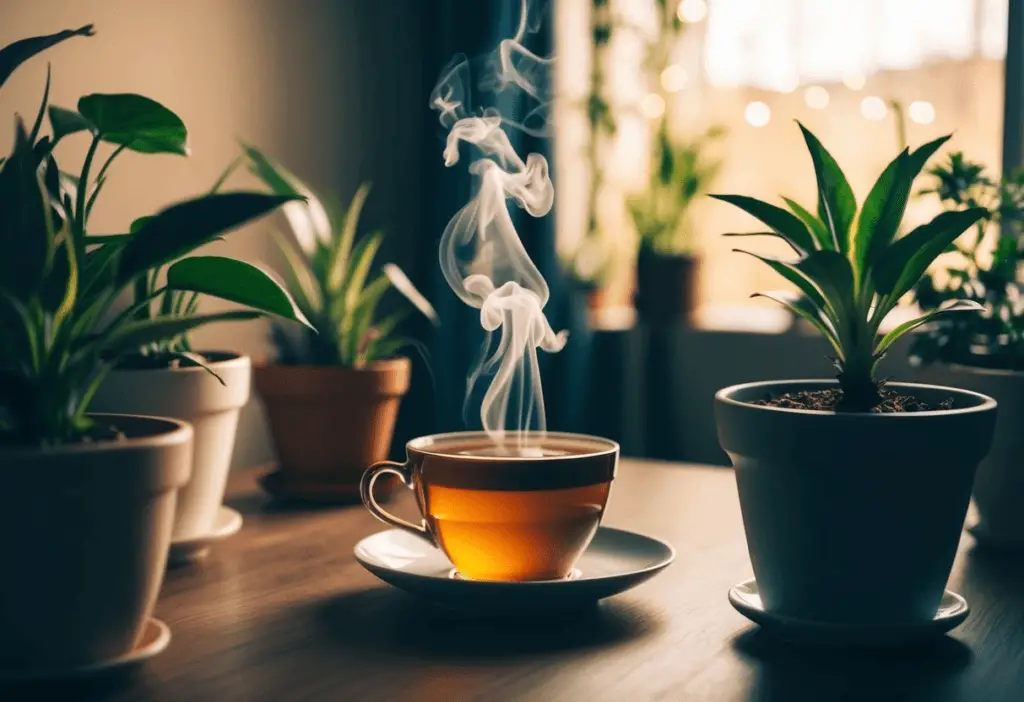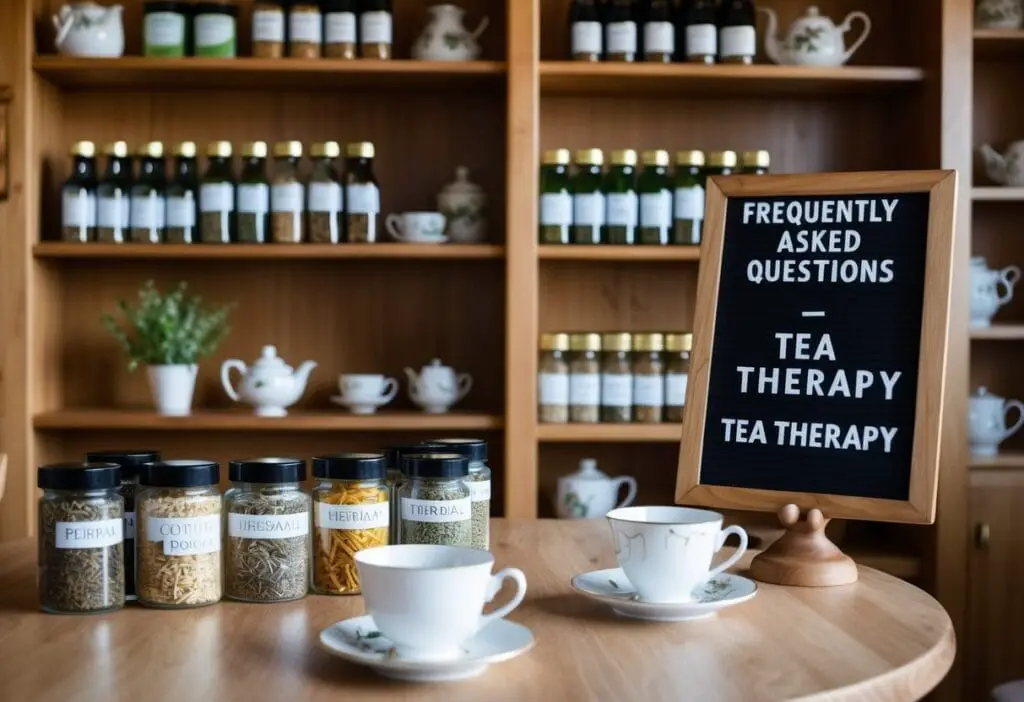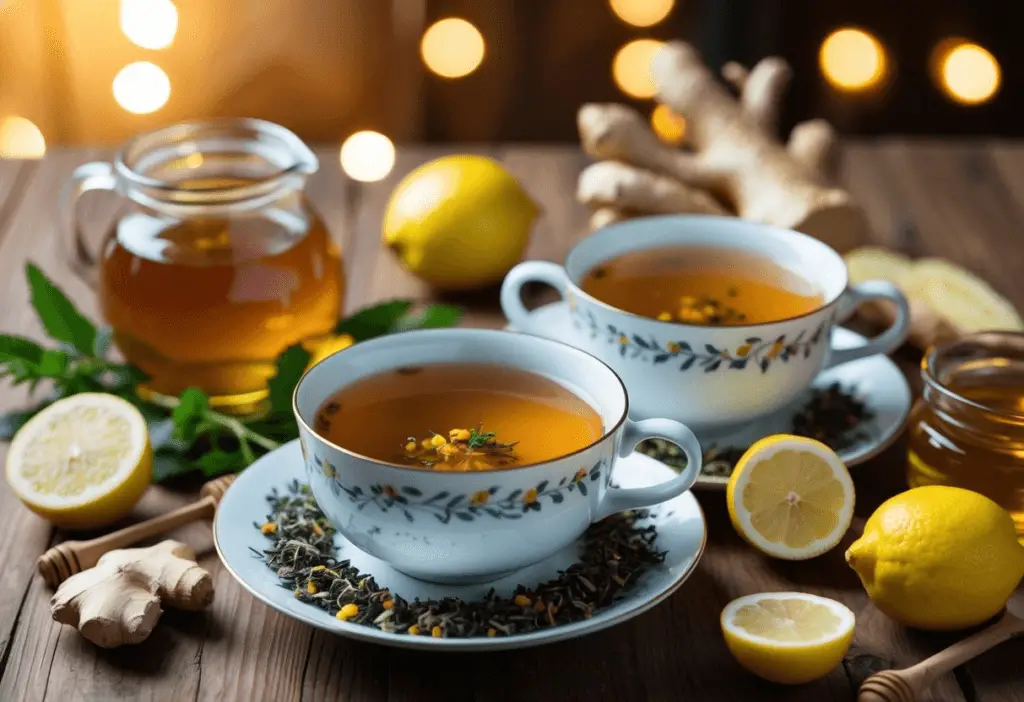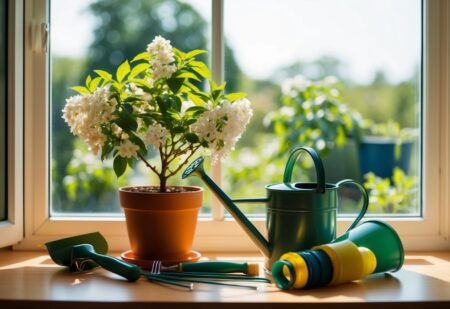Whether you’re a coffee devotee or a lifelong tea lover, there’s no denying the magic of a steaming cup of tea. Beyond its comforting warmth, tea offers a treasure trove of health benefits—a practice known as tea therapy. From easing colds and soothing digestion to boosting energy and promoting relaxation, tea can be your natural remedy and daily wellness companion.
In this article, I’ve crafted a unique guide to help you unlock the health benefits of tea. We’ll explore teas tailored to different times of the day and specific remedies for common ailments, all while sharing easy recipes to bring tea therapy into your life. Ready to sip your way to better health? Let’s dive in!
Table of Contents
Daily Tea Rituals: A Sip for Every Moment
Why not make tea a cornerstone of your day? Each variety offers unique benefits to enhance your routine, from morning vitality to evening calm. Here’s how to weave tea into your daily life:
1. Morning Wake-Up: Turmeric Tea
Start your day with the golden glow of turmeric tea. This powerhouse drink is loaded with curcumin, a compound celebrated for its anti-inflammatory and immune-boosting properties. It’s the perfect way to kickstart your morning with energy and resilience.
How to Make Turmeric Tea:
- Bring 1 cup of water to a rolling boil.
- Stir in ¼ teaspoon of turmeric powder (or freshly grated turmeric) and a pinch of black pepper to boost absorption.
- Simmer for 1-2 minutes, then strain into a cup.
- Add a teaspoon of honey for a sweet touch (optional).
Sip Tip: Enjoy this earthy tea as the sun rises to awaken your body and fortify your defenses.
2. Mid-Morning Boost: Masala Chai
When the clock nears brunch, reach for a cup of masala chai. This spiced blend of black tea, cinnamon, cardamom, and ginger is rich in antioxidants, giving you a flavorful lift to power through your morning.
How to Make Masala Chai:
- Lightly crush a mix of spices: cinnamon, cardamom, ginger, peppercorns, and cloves.
- Optional: Toast the spices briefly for a deeper flavor.
- Boil 1 cup of water, add the spices, and simmer for 2-3 minutes.
- Stir in 1 teaspoon of black tea leaves, a splash of milk, and sugar to taste.
- Boil for another 2-3 minutes, strain, and savor.
3. Afternoon Refresher: Green Tea
Post-lunch sluggishness? Green tea is your answer. Packed with catechins—antioxidants that aid digestion and stabilize energy—this light, refreshing tea keeps you sharp and focused into the afternoon.
How to Make Green Tea:
- Heat 1 cup of water until it’s nearly boiling, then remove from heat.
- Place a green tea bag or 1 teaspoon of loose leaves in a cup.
- Pour the hot water over the tea and steep for 2-3 minutes.
- Strain if needed, and add a drizzle of honey (optional).
Pro Tip: Sip slowly to let green tea’s subtle flavors cleanse your palate and recharge your day.
4. Nighttime Calm: Chamomile Tea
End your day with the gentle embrace of chamomile tea. Known for its soothing, sleep-inducing qualities, this floral brew helps you unwind and drift into a peaceful slumber.
How to Make Chamomile Tea:
- Boil 1 cup of water.
- Add a chamomile tea bag or 1 tablespoon of dried chamomile flowers.
- Simmer for 1 minute, then steep for 2-3 minutes off the heat.
- Strain into a cup and sweeten with honey or sugar if desired.
Relaxation Hack: Sip this 30 minutes before bed
to ease into a restful night.
Tea Remedies: Nature’s Fix for Common Woes

Tea isn’t just for daily enjoyment—it’s a remedy chest in disguise. Here are targeted teas to tackle specific health challenges:
1. Cinnamon Tea for Sinus and Sore Throat
When sinus congestion or a scratchy throat strikes, cinnamon tea comes to the rescue. Cinnamon boosts immunity, while honey soothes inflammation, offering sweet relief.
How to Make Cinnamon Tea:
- Boil 1 cup of water, then remove from heat.
- In a cup, mix ¼ teaspoon of cinnamon powder with 1 teaspoon of honey.
- Pour the hot water over the mixture and stir until blended.
- Sip while warm.
Fast Fix: This tea clears your airways and comforts your throat in no time.
2. Ginger Tea for Bloating Relief
Feeling puffy after a meal? Ginger tea is a digestive superhero. Its anti-inflammatory properties ease bloating and support a happy gut.
How to Make Ginger Tea:
- Slice a 1-inch piece of fresh ginger and add to 2 cups of water in a saucepan.
- Optional: Toss in a cinnamon stick or mint leaves for extra zest.
- Simmer for 5 minutes, then strain into a cup.
- Add a teaspoon of honey and enjoy warm.
Gut Soother: Drink this after eating to banish discomfort and feel light again.
3. Matcha Tea for Glowing Skin
Dreaming of radiant skin? Matcha tea delivers. Bursting with antioxidants, it shields your skin from damage and fights aging, all while boosting energy.
How to Make Matcha Tea:
- Whisk ½ teaspoon of matcha powder with a splash of hot water until smooth.
- Add 1 cup of warm milk or water and mix well.
- Serve warm or chilled, as you like.
Beauty Bonus: Regular sips can leave your complexion clear and youthful.
4. Lemon Tea for Cold and Flu
When sniffles hit, lemon tea is your ally. Packed with vitamin C, it bolsters your immune system and eases cold symptoms with every warm sip.
How to Make Lemon Tea:
- Boil 1 cup of water and let it cool slightly.
- Squeeze half a lemon into a cup.
- Add the warm water and stir in 1 teaspoon of honey.
- Drink while hot.
Recovery Boost: This zesty tea hydrates and helps you bounce back faster.
The Power of Tea: Backed by Science

Tea’s benefits go beyond tradition—science agrees! Curcumin in turmeric fights inflammation, catechins in green tea support heart health, and chamomile’s compounds promote relaxation. These natural wonders make tea a simple yet potent tool for wellness.
Start Your Tea Therapy Journey
Incorporating tea therapy into your life is an easy, delicious way to nurture your body and mind. From energizing mornings with turmeric tea to unwinding with chamomile at night, every cup offers a step toward better health. Ready to explore? Try these recipes, find your go-to blends, and let tea work its magic.
What’s your favorite tea ritual? Give these a try and share your experience—I’d love to hear how tea therapy transforms your day!
Frequently Asked Questions

What are the health benefits of tea therapy?
Tea therapy offers various health advantages. It is known to help improve hydration, support digestion, and boost the immune system. Different types of tea can provide antioxidants that protect the body from free radical damage. Some teas may also promote relaxation and improve mental clarity.
How does tea therapy aid in stress relief?
Tea therapy helps in reducing stress by promoting calmness and relaxation. Many herbal teas have natural compounds that can lower anxiety levels. For example, chamomile and lavender teas are often used for their soothing effects. The ritual of brewing and enjoying tea can also enhance feelings of peace and mindfulness.
Can tea therapy help with managing weight?
Tea therapy may assist in weight management by supporting metabolism and fat burning. Some teas, such as green tea, contain compounds that promote better metabolic rates. Drinking tea can also help curb appetite and reduce cravings for unhealthy snacks.
Which types of tea are best for therapeutic use?
Several types of tea are effective for therapeutic purposes. Green tea, known for its antioxidant properties, can support overall health. Herbal teas, such as peppermint and ginger, can aid digestion and relieve nausea. Others like oolong or black tea can improve energy levels and focus.
Are there any risks or side effects of tea therapy?
While tea therapy is generally safe, there are some potential risks and side effects. Caffeine-containing teas may cause jitters or insomnia if consumed in excess. Herbal teas can interact with medications or cause allergies in some individuals. It is essential to choose tea types wisely and consult a healthcare provider if there are concerns.
How does tea therapy enhance traditional medicine?
Tea therapy can complement traditional medicine by providing additional support for health and wellness. It may enhance the effects of herbal treatments and promote faster recovery. Drinking tea can also be part of a holistic approach that includes nutrition and lifestyle changes.






